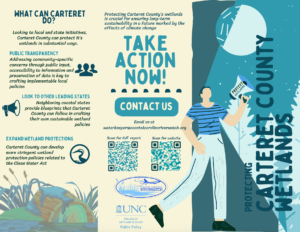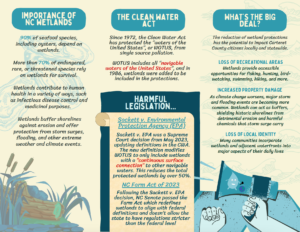

UNC Public Policy Capstone – Fall 2023
In the Fall semester of 2023, CCRW partnered with a UNC Public Policy class to research wetland threats in Carteret County for their capstone project.
The definition of protected wetlands has changed on the federal and state level, which has left over 50% of North Carolina wetlands available for development. Wetlands in coastal areas are critical for absorbing flood waters, minimizing pollution into streams and rivers, and providing habitat for important fishery species. Many local governments and developers do not fully understand the importance of wetlands and will continue to reduce the quantity and quality of wetlands throughout the coast.
The research question was: How will projected wetlands degradation impact water quality in NC Carteret County?
CCRW wanted to be able to use the project deliverables to influence dredge and fill permit requests by developers and promote wetland restoration and protection in Carteret County. With data and graphics showing how potential wetland loss had and potentially would impact water quality and associated resources, CCRW could help educate policy makers on the value of wetlands and encourage them to adopt sustainable wetlands practices.
The students researched current wetland practices and protections at the federal, state, and local levels by contacting local governments, assessing documents available on their websites, and examining existing federal and state wetlands regulations. Key policy makers at federal, state, and local levels were identified along with their areas of responsibility.
The students identified specific areas of concern in Carteret County that had minimal wetlands remaining and had multiple proposed developments. This was done by contacting state and local departments and requesting details on development proposals. The students also researched trends in water quality and land use over time using data available by the state and GIS maps publicly available.
This collection of data and understanding of policy will allow CCRW to strengthen their community advocacy by highlighting science driven relationships between wetlands and water quality. These resources can be used by CCRW and our community advocates when speaking to municipal staff, local commissioners, and developers. By highlighting the importance of wetlands and creating easy to understand visuals, planners can make better informed decisions about land use and future planning.
Read the full research report from the UNC students here:
